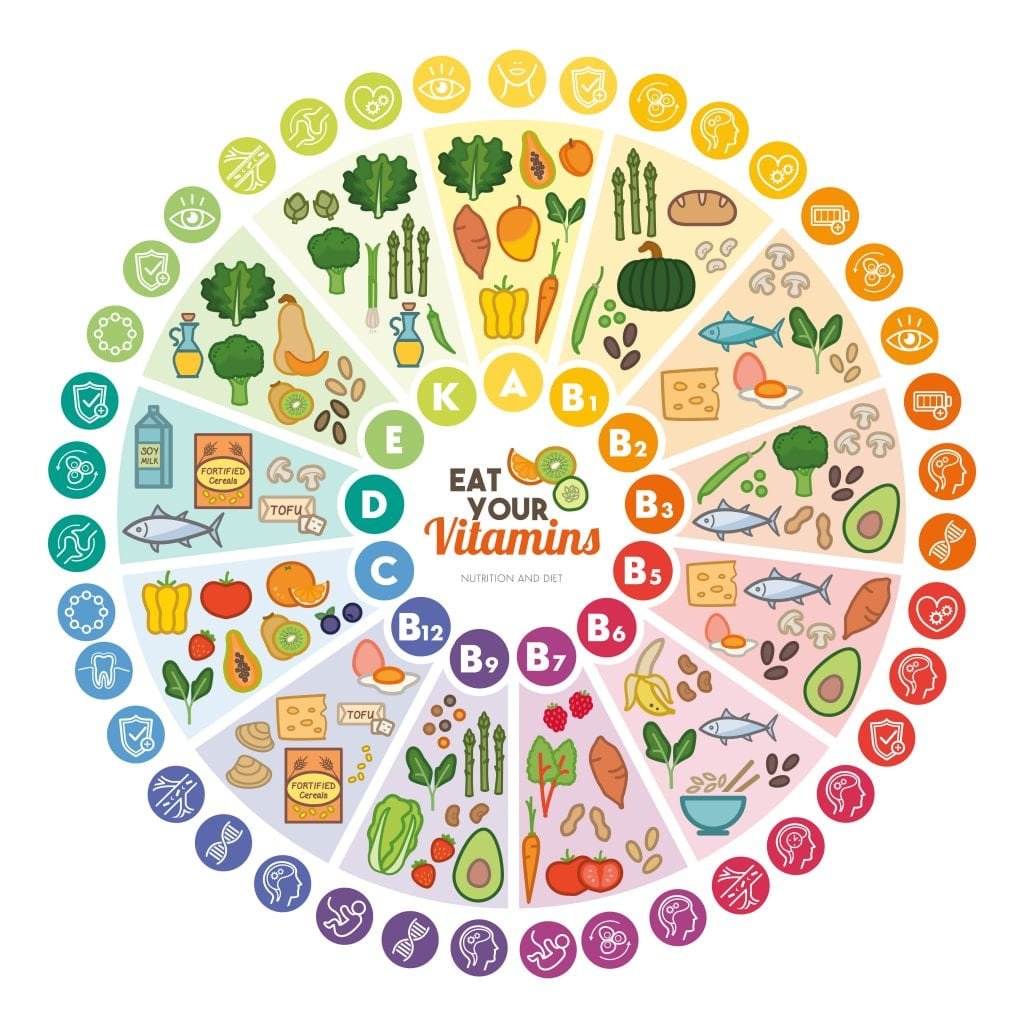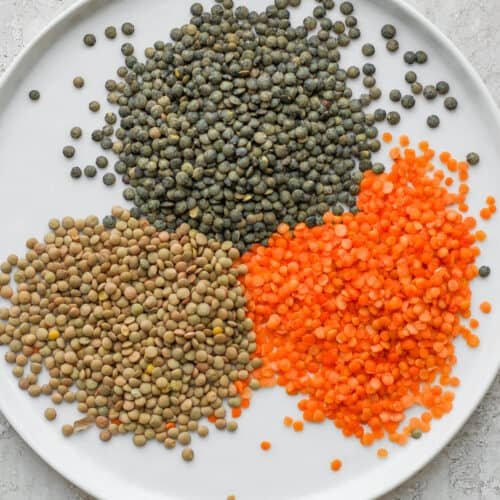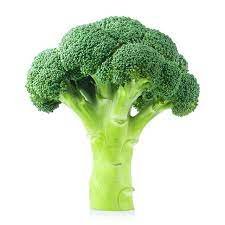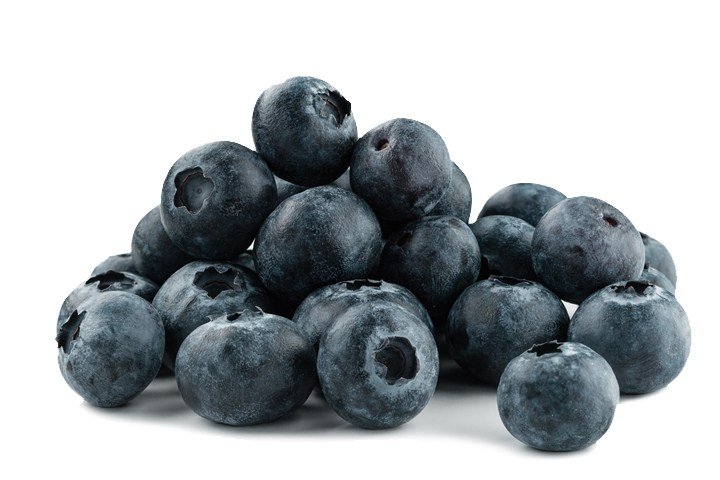Table of Contents

Introduction of Vitamins
Vitamins are organic compounds that are essential for the proper functioning of the human body. They are micronutrients, meaning that they are required in small amounts but are crucial for various physiological processes. Vitamins play a vital role in maintaining good health and preventing various diseases.
Here is a brief introduction to vitamins:
- Classification: Vitamins are typically classified into two categories based on their solubility in water or fat:
- Water-Soluble Vitamins: These include vitamin C and the B-complex vitamins (such as B1, B2, B3, B5, B6, B7, B9, and B12). They dissolve in water and are not stored in the body for extended periods. Excess amounts are excreted in urine.
- Fat-Soluble Vitamins: These include vitamins A, D, E, and K. They are absorbed in the presence of dietary fats and can be stored in the body’s fat tissues.
- Functions: Each vitamin has specific functions in the body. For example:
- Vitamin A is essential for vision, skin health, and immune function.
- Vitamin C is an antioxidant that supports the immune system and helps with collagen production.
- Vitamin D is crucial for bone health and calcium absorption.
- Vitamin K is necessary for blood clotting.
- The B-complex vitamins are involved in energy metabolism, nerve function, and the formation of red blood cells.
- Sources: Vitamins can be obtained through a balanced diet that includes a variety of foods. Different vitamins are found in various food groups, such as fruits, vegetables, grains, dairy products, and lean meats. Some vitamins can also be synthesized by the body when exposed to sunlight, as is the case with vitamin D.
- Deficiency and Excess: Insufficient intake of vitamins can lead to deficiency diseases, while excessive consumption of certain vitamins can cause toxicity. Maintaining an appropriate balance is essential for overall health.
- Supplements: In some cases, individuals may need vitamin supplements if they have specific dietary restrictions, medical conditions, or deficiencies. However, it’s generally recommended to obtain vitamins through a balanced diet rather than relying solely on supplements.
- Importance: Vitamins are critical for growth, development, and overall well-being. Deficiencies in vitamins can lead to a range of health problems, including rickets, scurvy, beriberi, and night blindness, among others.
- Recommended Daily Allowances (RDAs): Health authorities provide recommended daily intake guidelines for each vitamin to help individuals meet their nutritional needs.
It’s important to note that while vitamins are essential, more is not always better. Excessive intake of certain vitamins can have adverse effects on health. Therefore, it’s advisable to consult with a healthcare professional or nutritionist to determine individual vitamin needs and to ensure a balanced and healthy diet.
also read15 Advantages of vegetarian food
How many types of vitamins are there

How many types vitamins are there
There are a total of 13 recognized vitamins that are essential for the proper functioning of the human body. These vitamins are typically categorized into two groups based on their solubility:
- Water-Soluble Vitamins:
- Vitamin C (Ascorbic Acid)
- Vitamin B1 (Thiamine)
- Vitamin B2 (Riboflavin)
- Vitamin B3 (Niacin)
- Vitamin B5 (Pantothenic Acid)
- Vitamin B6 (Pyridoxine)
- Vitamin B7 (Biotin)
- Vitamin B9 (Folate or Folic Acid)
- Vitamin B12 (Cobalamin)
- Fat-Soluble Vitamins:
- Vitamin A (Retinol)
- Vitamin D (Calciferol)
- Vitamin E (Tocopherol)
- Vitamin K (Phylloquinone)
Each of these vitamins plays specific roles in various bodily functions, and they are essential for maintaining good health. A balanced diet that includes a variety of foods from different food groups typically provides the necessary vitamins for most individuals. However, in some cases, dietary supplements may be recommended to meet specific vitamin requirements or address deficiencies.
Sources of vitamins
Sources of vitamins
Vitamins can be obtained from a variety of natural food sources. Here are some common dietary sources for different vitamins:
- Vitamin A:
- Animal Sources: Liver, fish oils, egg yolks, and dairy products.
- Plant Sources: Carrots, sweet potatoes, pumpkin, spinach, kale, and other dark leafy greens.
- Vitamin B1 (Thiamine):
- Whole grains, legumes, pork, nuts, and seeds.
- Vitamin B2 (Riboflavin):
- Dairy products, lean meats, eggs, green leafy vegetables, and nuts.
- Vitamin B3 (Niacin):
- Meat, poultry, fish, whole grains, nuts, and legumes.
- Vitamin B5 (Pantothenic Acid):
- Found in a wide variety of foods, including meat, whole grains, legumes, and vegetables.
- Vitamin B6 (Pyridoxine):
- Chickpeas, poultry, fish, potatoes, and non-citrus fruits.
- Vitamin B7 (Biotin):
- Eggs, nuts, seeds, and some vegetables like sweet potatoes.
- Vitamin B9 (Folate or Folic Acid):
- Leafy greens (spinach, kale), legumes (beans, lentils), citrus fruits, and fortified grains.
- Vitamin B12 (Cobalamin):
- Animal products like meat, fish, dairy, and fortified foods for vegetarians and vegans.
- Vitamin C (Ascorbic Acid):
- Citrus fruits (oranges, lemons), strawberries, kiwi, tomatoes, and bell peppers.
- Vitamin D (Calciferol):
- Sunlight (the body can synthesize vitamin D when the skin is exposed to sunlight).
- Fatty fish (salmon, mackerel), fortified dairy and plant-based milk, and egg yolks.
- Vitamin E (Tocopherol):
- Nuts (almonds, hazelnuts), seeds (sunflower seeds), vegetable oils, and leafy greens.
- Vitamin K (Phylloquinone):
- Green leafy vegetables (kale, spinach, broccoli), vegetable oils, and some fruits.
It’s important to note that a balanced diet that includes a variety of foods from different food groups typically provides the necessary vitamins for most individuals. In some cases, dietary supplements may be recommended to meet specific vitamin requirements or address deficiencies, but it’s generally preferable to obtain vitamins through natural food sources whenever possible, as they often come with other beneficial nutrients and compounds. Consulting with a healthcare professional or nutritionist can help determine individual dietary needs.
vitamin list
vitamin list
Certainly! Here is a list of the 13 essential vitamins along with their common names and functions:
Water-Soluble Vitamins:
- Vitamin C (Ascorbic Acid):
- Function: Acts as an antioxidant, supports the immune system, and aids in collagen production.
- Sources: Citrus fruits, strawberries, kiwi, bell peppers, and broccoli.
- Vitamin B1 (Thiamine):
- Function: Supports energy metabolism and nerve function.
- Sources: Whole grains, legumes, pork, nuts, and seeds.
- Vitamin B2 (Riboflavin):
- Function: Supports energy production and overall growth.
- Sources: Dairy products, lean meats, eggs, green leafy vegetables, and nuts.
- Vitamin B3 (Niacin):
- Function: Supports energy metabolism and overall cellular health.
- Sources: Meat, poultry, fish, whole grains, nuts, and legumes.
- Vitamin B5 (Pantothenic Acid):
- Function: Essential for the synthesis of fatty acids and energy metabolism.
- Sources: Found in a wide variety of foods, including meat, whole grains, legumes, and vegetables.
- Vitamin B6 (Pyridoxine):
- Function: Supports amino acid metabolism, nerve function, and red blood cell production.
- Sources: Chickpeas, poultry, fish, potatoes, and non-citrus fruits.
- Vitamin B7 (Biotin):
- Function: Important for fatty acid synthesis and overall cellular health.
- Sources: Eggs, nuts, seeds, and some vegetables like sweet potatoes.
- Vitamin B9 (Folate or Folic Acid):
- Function: Essential for DNA synthesis and cell division.
- Sources: Leafy greens (spinach, kale), legumes (beans, lentils), citrus fruits, and fortified grains.
- Vitamin B12 (Cobalamin):
- Function: Important for DNA synthesis, nerve function, and red blood cell production.
- Sources: Found in animal products like meat, fish, dairy, and fortified foods for vegetarians and vegans.
Fat-Soluble Vitamins:
- Vitamin A (Retinol):
- Function: Essential for vision, immune function, and skin health.
- Sources: Liver, fish oils, egg yolks, and foods like carrots, sweet potatoes, spinach, and kale.
- Vitamin D (Calciferol):
- Function: Crucial for calcium absorption and bone health.
- Sources: Sunlight (skin synthesis) and dietary sources like fatty fish (salmon, mackerel), fortified dairy, plant-based milk, and egg yolks.
- Vitamin E (Tocopherol):
- Function: Acts as an antioxidant, protects cell membranes, and supports skin health.
- Sources: Nuts (almonds, hazelnuts), seeds (sunflower seeds), vegetable oils, and leafy greens.
- Vitamin K (Phylloquinone):
- Function: Essential for blood clotting and bone health.
- Sources: Green leafy vegetables (kale, spinach, broccoli), vegetable oils, and some fruits.
These vitamins are essential for various bodily functions, and a balanced diet that includes a variety of foods can help ensure you get an adequate supply of each.
All vitamins chart in English
| English Name | Hindi Name | Dietary Sources | Examples |
|---|---|---|---|
| Vitamin A | विटामिन ए | – Liver, fish oils, egg yolks, carrots, sweet potatoes, spinach, kale | carrot-  , spinach , spinach |
| Vitamin B1 (Thiamine) | विटामिन बी1 (थायमिन) | – Whole grains, legumes, pork, nuts, seeds, brown rice, beans, peanuts, sunflower seeds | –  , brown rice , brown rice peanuts peanuts |
| Vitamin B2 (Riboflavin) | विटामिन बी2 (राइबोफ्लेविन) | – Dairy products, lean meats, eggs, green leafy vegetables, nuts, milk, yogurt, spinach, almonds | –  milk, milk,  almonds almonds |
| Vitamin B3 (Niacin) | विटामिन बी3 (नाइसिन) | – Meat, poultry, fish, whole grains, nuts, legumes, chicken, salmon, peanuts, whole wheat | –  chicken, chicken,  salmon salmon |
| Vitamin B5 (Pantothenic Acid) | विटामिन बी5 (पैंथोथेनिक एसिड) | – Found in a wide variety of foods, including meat, whole grains, legumes, and vegetables, avocado, mushrooms, chicken, lentils | –  avocado, avocado,  lentils lentils |
| Vitamin B6 (Pyridoxine) | विटामिन बी6 (पायरिडॉक्सीन) | – Chickpeas, poultry, fish, potatoes, non-citrus fruits, bananas, potatoes, turkey, salmon | –  ,Banana ,Banana  Turkey Turkey |
| Vitamin B7 (Biotin) | विटामिन बी7 (बायोटिन) | – Eggs, nuts, seeds, some vegetables like sweet potatoes, almonds, peanuts, eggs, sweet potatoes | –  eggs, eggs,  sweet potatoes sweet potatoes |
| Vitamin B9 (Folate/Folic Acid) | विटामिन बी9 (फोलिक एसिड) | – Leafy greens (spinach, kale), legumes (beans, lentils), citrus fruits, fortified grains, spinach, lentils, oranges, fortified cereals | –  spinach spinach,  Orange |
| Vitamin B12 (Cobalamin) | विटामिन बी12 (कोबलामिन) | – Found in animal products like meat, fish, dairy, and fortified foods for vegetarians and vegans, beef, salmon, milk, fortified cereals | –  meat meat,  milk milk |
| Vitamin C | विटामिन सी | – Citrus fruits (oranges, lemons), strawberries, kiwi, tomatoes, bell peppers, oranges, strawberries, bell peppers, broccoli | –  strawberry, strawberry,  broccoli broccoli |
| Vitamin D | विटामिन डी | – Sunlight (skin synthesis) and dietary sources like fatty fish (salmon, mackerel), fortified dairy, plant-based milk, and egg yolks, salmon, fortified milk, egg yolks | –  salmon, salmon,  egg yolks egg yolks |
| Vitamin E | विटामिन ई | – Nuts (almonds, hazelnuts), seeds (sunflower seeds), vegetable oils, and leafy greens, almonds, sunflower seeds, spinach, olive oil |  almonds almonds Olive Oil |
| Vitamin K | विटामिन के | – Green leafy vegetables (kale, spinach, broccoli), vegetable oils, and some fruits, kale, spinach, broccoli, blueberries | –  kale, kale,  Blueberry |
Conclusion
In conclusion, vitamins are essential organic compounds that play vital roles in maintaining overall health and well-being. There are 13 recognized essential vitamins, categorized into water-soluble and fat-soluble vitamins. These vitamins are crucial for various bodily functions, including energy metabolism, immune support, bone health, and more.
A balanced diet that includes a variety of foods from different food groups can provide the necessary vitamins for most individuals. It’s important to be aware of dietary sources and examples of each vitamin to ensure proper nutrition. In cases of deficiencies or specific dietary needs, supplements may be recommended, but obtaining vitamins through natural food sources is generally preferable.
Remember that while vitamins are important for health, it’s essential to consume them in appropriate quantities, as excessive intake of certain vitamins can have adverse effects. Consulting with a healthcare professional or nutritionist can help individuals determine their specific vitamin requirements and maintain a balanced and healthy diet.
FAQs
Here are some frequently asked questions (FAQs) on various topics:
1. What are vitamins, and why are they important?
- these are organic compounds that the body needs in small amounts for various essential functions. They play crucial roles in metabolism, growth, immune function, and overall health.
2. How can I get enough vitamins in my diet?
- You can obtain these through a balanced diet that includes a variety of foods. Eating fruits, vegetables, lean proteins, whole grains, and dairy or dairy alternatives can help ensure you get a wide range of vitamins.
3. What happens if I don’t get enough vitamins?
- Vitamin deficiencies can lead to various health problems. For example, vitamin D deficiency can cause weak bones, while vitamin C deficiency can result in scurvy. A balanced diet helps prevent such deficiencies.
4. Are vitamin supplements necessary?
- In most cases, supplements are not necessary for individuals with a balanced diet. Supplements should be considered when there is a specific deficiency or as recommended by a healthcare professional.
5. What are the water-soluble vitamins?
- Water-soluble vitamins include vitamin C and the B-complex vitamins (B1, B2, B3, B5, B6, B7, B9, B12). They dissolve in water and are not stored in the body for long periods.
6. What are the fat-soluble vitamins?
- Fat-soluble vitamins include vitamin A, D, E, and K. They are absorbed in the presence of dietary fats and can be stored in the body’s fat tissues.
7. Can I get vitamins from sunlight?
- Yes, vitamin D can be synthesized by the skin when exposed to sunlight. It’s often called the “sunshine vitamin.”
8. Can I overdose on vitamins?
- Excessive intake of certain these , especially fat-soluble ones, can lead to toxicity. It’s important to follow recommended daily allowances (RDAs) and not overuse supplements.
9. How can I identify foods rich in specific vitamins?
- Nutritional labels on food packages provide information about vitamin content. Additionally, nutrition apps and websites can help you identify vitamin-rich foods.
10. Are there any specific dietary recommendations for vegetarians and vegans? –
Vegetarians and vegans can get all the necessary those through plant-based sources, but they should pay attention to vitamin B12, which is primarily found in animal products. Fortified foods and supplements are available for B12.
These FAQs cover some common questions about vitamins and nutrition.
https://en.wikipedia.org/wiki/Vitamin
read how to get naturally glowing skin click on page👇






